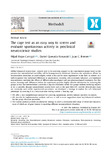The cage test as an easy way to screen and evaluate spontaneous activity in preclinical neuroscience studies
artículo original

Ver/
Fecha
2021-02-17Autor
Rojas Carvajal, Mijail
Quesada Yamasaki, Daniel
Brenes Sáenz, Juan Carlos
Metadatos
Mostrar el registro completo del ítemResumen
Within behavioral neuroscience, subjects used to be randomly assigned to the experimental groups based on the premise that interindividual variability will be homogeneously distributed. However, the equivalence offered by randomization diminishes in small samples, which is the case for most experiments in the field. In rodents, it is well-recognized that individual differences in psychomotor reactivity, risk-assessment behaviors, and emotional responsiveness modulate the effects of different pharmacological and non-pharmacological treatments. For that reason, knowing such differences before the experiment provides highly valuable information for balancing the groups so that the interindividual variability is equally distributed within the groups without excluding subjects as far as possible. Because unconditioned anxiety tests such as the open-field (OF) and the elevated plus-maze are commonly used within experimental procedures, we developed a strategy to explore the rat’s behavioral phenotype by assessing it in a very innocuous testing context: a housing cage.
•We offer a very straightforward protocol for assessing spontaneous, novelty-induced reactivity in rodents. •We describe its implementation, analysis, and use, as well as some suggestions about key behavioral readouts for the group allocation procedure.
•The current protocol provides an alternative strategy to assess a reasonably wide range of behavioral outcomes, most of which are of great interest in modeling different neuropsychiatric disorders.
External link to the item
10.1016/j.mex.2021.101271Colecciones
- Biología [1644]

